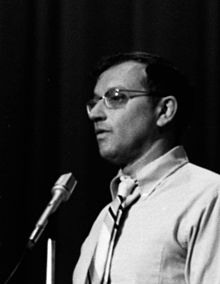Allard K. Lowenstein
Allard Kenneth Lowenstein (* 16th January 1929 in Newark , New Jersey ; † 14. March 1980 in New York City ) was an American politician of the Democratic Party and legal scholars . He was an outstanding member of the civil rights movement in the 1960s and 1970s, many young people in the United States for a commitment in this area and for human rights worldwide (opposition to the Vietnam War, anti-Apartheid movement u. A.) Mobilized and the Democratic Party charging thereto .
Life
Lowenstein attended the Horace Mann School in New York City and studied law at the University of North Carolina and Yale University . As a student, the President of the National Students Association and as early as 1949 assistant to Senator (and University President of the University of North Carolina) Frank Porter Graham . After graduating from Yale Law School in 1954, he served two years in the US Army. He then got a job as a law professor at Stanford University , then at North Carolina State University and then at City College of New York . In 1957 he worked with Eleanor Roosevelt at the American Association for the United Nations and in 1959 became Foreign Policy Secretary to the Democratic Senator Hubert H. Humphrey . In 1960, 1964 and 1968 he was a delegate at the nomination congresses of the Democratic Party. For the 5th District in Nassau County , New York , Lowenstein was a member of the Democratic Party in the United States House of Representatives from 1969 to 1971 . In 1977 he became head of the US delegation to the 33rd annual meeting of the UN Commission on Human Rights in Geneva and in 1977/78 he was US representative for special political matters to the UN with the rank of ambassador.
He was an active opponent of apartheid politics in South Africa , which he first visited in 1958. He wrote the book Brutal Mandate (1962) about a trip to Namibia. In his role as US representative at the UN at the end of the 1970s, he was again active against apartheid. In 1963/64 he organized the participation of white students in Yale and Stanford in the civil rights movement in Yale in order to support African Americans in the southern states in the fight for the right to vote. He was also a prominent figure in the anti-Vietnam movement of the 1960s and organized a campaign to discourage Democratic President Lyndon B. Johnson from running again for the Democratic presidential run in 1968.
In 1971 he campaigned against Richard Nixon ( Dump Nixon ) as head of the Americans for Democratic Action . In 1975 he was a staunch supporter of a re-investigation into the Robert F. Kennedy assassination , as he believed in a conspiracy and not in the lone perpetrator of Sirhan Sirhan , as he publicly stated in a PBS interview.
In 1972 he was defeated at the Democratic nomination party for Congress in Brooklyn . In 1974 and 1976 he was defeated in the Senate elections in a traditionally republican district (Nassau County) in Long Island (1974 he was very narrowly defeated). In Long Island, he had already been elected to Congress in 1968, but was narrowly defeated in a new election in 1970 after the Republicans changed the constituency lines in their favor.
On March 14, 1980, he was shot dead in his New York office by the mentally deranged Dennis Sweeney. Sweeney knew Lowenstein briefly from his student days in the 1960s (author David Harris, a fellow Sweeney student, wrote a book about the events). In the process he was classified as insane because of schizophrenia and was admitted to a psychiatric clinic. The funeral orations for Lowenstein were given by the writer and journalist William F. Buckley, Jr. (who - although conservative - had previously supported him in his campaigns in Long Island) and Senator Edward Kennedy . Lowenstein is a former US soldier buried in Arlington National Cemetery. On the grave stone is a quote that once sent him Robert Kennedy: If a single man plants himself on his convictions and there abide, the huge world will come around to him ( If an individual is entitled to his beliefs, will the whole world to collect him ).
Yale University founded the Allard K. Lowenstein International Human Rights Project in 1981, which resulted in the Allard K. Lowenstein International Human Rights Clinic in 1989. His written estate is in the Long Beach New York Public Library (named after him). In 1978 he resigned from his post at the UN to run for the Democrats in New York for Congress, where he was narrowly defeated in the nomination.
Lowenstein was married to Jennifer Lyman from 1966 to 1977 and had two sons and a daughter.
literature
- William H. Chafe: Never stop running. Allard Lowenstein and the struggle to save American liberalism. Princeton University Press, 1998.
- Richard Cummings: The Pied Piper. Allard K. Lowenstein and the liberal dream. InPrint, 1985.
- David Harris: Dream's die hard. Three men's journey through the sixties. Mercury House, 1982, 1993.
Web links
- Allard K. Lowenstein in the Biographical Directory of the United States Congress (English)
- Biography of Allard K. Lowenstein. (January 2, 2014 memento on the Internet Archive ) Yale Law School.
Individual evidence
| personal data | |
|---|---|
| SURNAME | Lowenstein, Allard K. |
| ALTERNATIVE NAMES | Lowenstein, Allard Kenneth (full name) |
| BRIEF DESCRIPTION | American politician |
| DATE OF BIRTH | January 16, 1929 |
| PLACE OF BIRTH | Newark , New Jersey |
| DATE OF DEATH | March 14, 1980 |
| Place of death | New York City |


